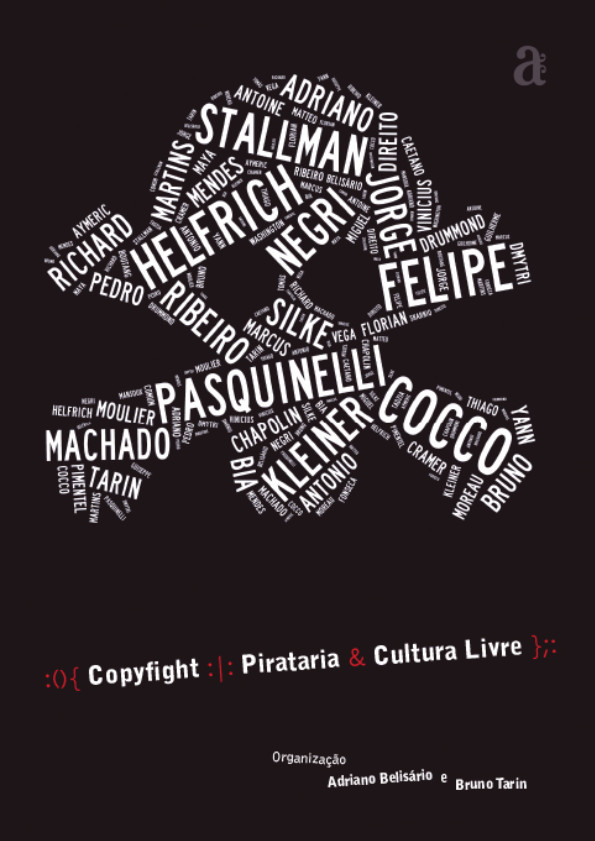Alex Sayf Cummings: Democracy of Sound: Music Piracy and the Remaking of American Copyright in the Twentieth Century (2013)
Filed under book | Tags: · copyright, counterculture, intellectual property, law, music, new media, phonograph, piracy

“It was a time when music fans copied and traded recordings without permission. An outraged music industry pushed Congress to pass anti-piracy legislation. Yes, that time is now; it was also the era of Napster in the 1990s, of cassette tapes in the 1970s, of reel-to-reel tapes in the 1950s, even the phonograph epoch of the 1930s. Piracy, it turns out, is as old as recorded music itself.
In Democracy of Sound, Alex Sayf Cummings uncovers the little-known history of music piracy and its sweeping effects on the definition of copyright in the United States. When copyright emerged, only visual material such as books and maps were thought to deserve protection; even musical compositions were not included until 1831. Once a performance could be captured on a wax cylinder or vinyl disc, profound questions arose over the meaning of intellectual property. Is only a written composition defined as a piece of art? If a singer performs a different interpretation of a song, is it a new and distinct work? Such questions have only grown more pressing with the rise of sampling and other forms of musical pastiche. Indeed, music has become the prime battleground between piracy and copyright. It is compact, making it easy to copy. And it is highly social, shared or traded through social networks–often networks that arise around music itself. But such networks also pose a counter-argument: as channels for copying and sharing sounds, they were instrumental in nourishing hip-hop and other new forms of music central to American culture today. Piracy is not always a bad thing.
An insightful and often entertaining look at the history of music piracy, Democracy of Sound offers invaluable background to one of the hot-button issues involving creativity and the law.
– Provides a political and historical perspective on the rise of the “information economy.”
– Discusses rare and little-known unreleased songs by the Beatles, which are potentially controversial because of their racial content.
– Shows how piracy has been integral to the music industry through much of its history and how pirates have influenced copyright law.”
Publisher Oxford University Press, 2013
ISBN 0199858225, 9780199858224
336 pages
Adriano Belisário, Bruno Tarin (eds.): Pirataria & Cultura Livre (2012) [Portuguese]
Filed under book | Tags: · copyleft, copyright, free culture, intellectual property, piracy

Copyfight is a collection of Brazilian Portuguese texts that aim to address some of the disputes around the topic of intellectual property, throwing new light on the subject and showing how such conflicts have impacts not only in the field of media culture, but also on our everyday lives, as well as on the production of machines, objects or food.
As stated in its introduction, “the goal of the book is not to broadcast a single view or a final proposal for the current issues about free culture and piracy, but rather unveil a multitude of reflections and practices. Copyfight does not refer to a world of perfect fittings, but a world of friction.” In this sense, the book develops a experimental to its reading, allowing the access of texts through thematic nodes or through the notes of the editors.
The project is the result of two meetings, held in 2010 and 2011 in Rio de Janeiro and gathers contributions from Giuseppe Cocco, Jorge Machado, f? erre!, Silke Helfrich, Matteo Pasquinelli, Richard Stallman, Beatriz Cintra Martins, Bruno Tarin, Pedro Mendes, Antonio Negri, Chapolin, Yann Moulier Boutang, Felipe Fonseca, Washington Luis Lima Drummond, Marcus Vinicius, Antoine Moreau, Dmytri Kleiner, Florian Cramer, Guilherme Pimentel, Aymeric Mansoux, Tadzia Maya, Tomás Vega, Thiago Skárnio, and Miguel Afonso Caetano.
Publisher Azougue Editorial, Rio de Janeiro, December 2012
Free Art License
274 pages
via Aymeric Mansoux
Jonathan Sterne: MP3: The Meaning of a Format (2012)
Filed under book | Tags: · codec, compression, filesharing, history of technology, information theory, listening, mp3, noise, piracy, psychoacoustics, recording, silence, sound recording, technology

“MP3: The Meaning of a Format recounts the hundred-year history of the world’s most common format for recorded audio. Understanding the historical meaning of the MP3 format entails rethinking the place of digital technologies in the larger universe of twentieth-century communication history, from hearing research conducted by the telephone industry in the 1910s, through the mid-century development of perceptual coding (the technology underlying the MP3), to the format’s promiscuous social life since the mid 1990s.
MP3s are products of compression, a process that removes sounds unlikely to be heard from recordings. Although media history is often characterized as a progression toward greater definition, fidelity, and truthfulness, MP3: The Meaning of a Format illuminates the crucial role of compression in the development of modern media and sound culture. Taking the history of compression as his point of departure, Jonathan Sterne investigates the relationships among sound, silence, sense, and noise; the commodity status of recorded sound and the economic role of piracy; and the importance of standards in the governance of our emerging media culture. He demonstrates that formats, standards, and infrastructures—and the need for content to fit inside them—are every bit as central to communication as the boxes we call “media.””
Publisher Duke University Press, Durham, NC, September 2012
Sign, Storage, Transmission series
ISBN 0822352877, 9780822352877
341 pages
Reviews: Robert Barry (review31), Hillegonda Rietveld (Times Higher Education), Hua Hsu (Slate).
Interview with the author: Eric Harvey (Pitchfork).
PDF (updated on 2021-4-9)
Comment (0)
